Medicine
Alumni stories
Some of our recent alumni share their stories post-graduation.
Susan Burslem
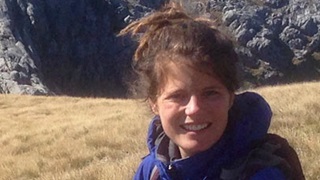 I’d never heard of Leicester Medical School before I applied. Having grown up in Kathmandu I didn’t know that the lecture halls, dissection rooms and three world class hospitals, would be the start of the job I still love. It was only after I arrived that I found I could get a decent curry.
I’d never heard of Leicester Medical School before I applied. Having grown up in Kathmandu I didn’t know that the lecture halls, dissection rooms and three world class hospitals, would be the start of the job I still love. It was only after I arrived that I found I could get a decent curry.
The course was a mixture of traditional lectures, study groups and dissections in the early years and I appreciated the structure compared to other more self-directed medical training. It was the friends I made then that kept me sane and we helped pull each other through. What was great about Leicester was the variety – my friends were from Australia, Germany, Jordan and Birmingham.
The early patient exposure during the training at Leicester was part of the reason I was able to keep studying. The course made sure we knew why we were doing all the bookwork. I took a year out of the regular medical school and did a BSc – a much more self-directed, self-motivated time. I found the support of the supervisors, both at the university and hospitals, excellent. In their busy days they found time to help.
After finishing medical school I have worked in Australia, New Zealand, Nepal and Bhutan and the medical training I received has held me in good stead. I now work as a rural hospital doctor or a rural GP. Working in small hospitals being a jack-of-all-trades – one day pulling a broken wrist straight, next resuscitating a newborn and the next organizing the palliative pain relief for a cancer patient. Having a flexible set of skills has meant that I’ve been able to work in a ski resort, outback Australia and small surfing towns – all work and no play is no fun.
Come to Leicester – to work and play.
Navin Leanage
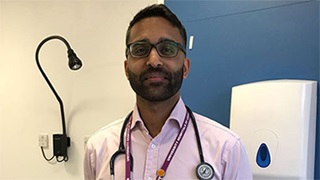 Leicester was my top choice Medical School both when I applied after school and when I re-applied after my first degree. The opportunities Leicester presents to its students has a unique feel. A mix of lectures and group work encouraged me to manage my time as well as helped me to learn through discussing questions. I found this way of learning suited me and looking back now it has prepared me for clinical practice and continuous learning on the job. Early exposure to patients helped me to understand sympathy and empathy as well as appreciate the patient journey. I particularly enjoyed dissection, this allowed us to learn anatomy in a way that no textbook could do justice. Having experienced this I have found that my understanding of anatomy has stuck with me and is something I have found easier to apply every day.
Leicester was my top choice Medical School both when I applied after school and when I re-applied after my first degree. The opportunities Leicester presents to its students has a unique feel. A mix of lectures and group work encouraged me to manage my time as well as helped me to learn through discussing questions. I found this way of learning suited me and looking back now it has prepared me for clinical practice and continuous learning on the job. Early exposure to patients helped me to understand sympathy and empathy as well as appreciate the patient journey. I particularly enjoyed dissection, this allowed us to learn anatomy in a way that no textbook could do justice. Having experienced this I have found that my understanding of anatomy has stuck with me and is something I have found easier to apply every day.
There are multiple sports teams and extra curricular activities on top of the University specific ones. Through these I was able to meet students from other years with diverse backgrounds and develop my interests outside of medicine. Leicester Medical School is a particularly sociable place with cohorts intermingling and supporting each other in academics. This is the kind of culture that I valued and feel all Leicester graduates take with them wherever they go.
I have never regretted my time here to the point where I have stayed on for my training primarily in Leicester and surrounding hospitals as well as working in the medical school as an academic clinical fellow from August 2019. I completed my foundation training having worked in all three Leicester hospitals which I thoroughly enjoyed. It helped that I had been in these hospitals as a student and had been supported by some of the healthcare professionals that I went on to work with. I continue to do academic work with the medical school which I aspire to develop a strong career in. I am also an Emergency Medicine trainee in the East Midlands. The hospitals here provide experience with some of the most diverse patient and staff demographic in the country with one of the biggest and busiest Emergency Departments that excels in teaching on a national level. We are lucky to have an incredible Cardio-Respiratory tertiary centre at Glenfield Hospital on top of the other outstanding departments. As Medical Students and Doctors we are often rotated to the fantastic surrounding District General Hospitals such as Northampton where I currently work. With all this on the doorstep of a friendly and empowering medical school it was not a difficult to decision to come here to study and start my career.
Richard Mair
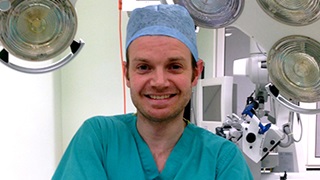 I graduated from Leicester Medical School in the July of 2004. Despite my never having seen any operative neurosurgery I decided I wanted to be a brain surgeon and so left Leicester soon after house jobs to be Henry Marsh’s SHO at Atkinson Morley’s in London. I was unable to get onto basic surgical training seemingly due to my lack of an Intercalated BSc and so I chose to create my own rotation by applying to numerous jobs on 6 monthly contracts. Thus over 18 months I was picked to be a casualty officer at the Royal London, an orthopaedic SHO at the NOC in Oxford and finally a 70-hour-a-week neurosurgical nobody at Queen Square in London.
I graduated from Leicester Medical School in the July of 2004. Despite my never having seen any operative neurosurgery I decided I wanted to be a brain surgeon and so left Leicester soon after house jobs to be Henry Marsh’s SHO at Atkinson Morley’s in London. I was unable to get onto basic surgical training seemingly due to my lack of an Intercalated BSc and so I chose to create my own rotation by applying to numerous jobs on 6 monthly contracts. Thus over 18 months I was picked to be a casualty officer at the Royal London, an orthopaedic SHO at the NOC in Oxford and finally a 70-hour-a-week neurosurgical nobody at Queen Square in London.
As part of the first modernising medical careers experiment I was fortunate to be given one of 9 training posts nationally in Neurosurgery and so made my way to Yorkshire. I hadn’t realised two things about what this role would entail: 1) I had to spend 2 years in Hull and 2) I would meet my wife. Both of these happy instances led to my becoming an experienced and well-rounded neurosurgical trainee. During this time I had decided that I enjoyed what little I knew of science and so I applied to the University of Cambridge to do a research degree. I found work in the laboratory of Kevin Brindle under the co-supervision of Colin Watts at the CRUK Cambridge Institute. This happened mid-way through ST7 and just after the birth of my first child and was only for a year. Despite several logistical difficulties, we moved and I remain very grateful to my wife for permitting this upheaval. With difficulty I managed to secure funding for a further 3 years of study after which I was awarded a PhD. The vagaries of neurosurgical training preclude inter deanery transfers and so a bespoke Clinical Lectureship was then arranged for me so that I could finish my training whilst maintaining my research interests. After CCT a dual academic/clinical post was created for me and so it was that I took up the post of University Lecturer in Neurosurgical Oncology at the University of Cambridge and Honorary Consultant Neurosurgeon at Addenbrooke’s Hospital in January of this year. From medical school in Leicester to being appointed as a consultant I have worked in 17 hospitals in 10 cities; it has taken 20 years.
My new job is the perfect balance of clinic and academia: I spend 2 days a week cramming theatre sessions, clinics, on calls and ward rounds into ever tighter schedules. I particularly love being in theatre and the complexity of operating on the human brain. I love the reward of successfully completing a difficult operation and the technical improvements that experience brings. Despite this, the frenetic nature of NHS practise is not something I wished to do full time. As such I spend the remainder of my week in the laboratory. My clinical work complements my laboratory research in neuro oncology and I manage to collect samples during my clinical practise that I can use to test scientific hypothesis. I am particularly interested in the tumour microenvironment and how this interacts with the cancer genome.
I wouldn’t say that this career is for everyone, I write this now at 10.00pm having been in the operating theatre since 7.30am and not having seen any of my three children conscious at all today. However, I feel very lucky to say that I genuinely look forward to (pretty much) whatever it is I have planned for the day, every day.
Dan Rogers
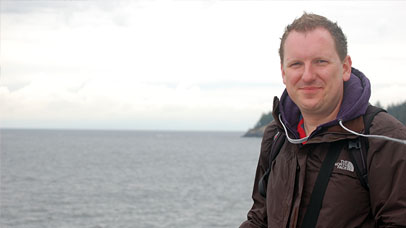 Despite it being a long time ago I can remember my first time visiting Leicester, it was raining. Despite this somewhat damp first impression I also distinctly remember how friendly and welcoming all the students and staff that I met were and how they all spoke very highly of the course and opportunities that studying medicine in Leicester offered. I only ever intended staying for the duration of my studies before moving back north, but some 20 odd years later I am still here, and still think it is a great place to study, work and live.
Despite it being a long time ago I can remember my first time visiting Leicester, it was raining. Despite this somewhat damp first impression I also distinctly remember how friendly and welcoming all the students and staff that I met were and how they all spoke very highly of the course and opportunities that studying medicine in Leicester offered. I only ever intended staying for the duration of my studies before moving back north, but some 20 odd years later I am still here, and still think it is a great place to study, work and live.
I’m now a Consultant Gastroenterologist in University Hospitals of Leicester and so work in one of the biggest Gastroenterology units in the country, and the training I received in Leicester as both an Undergraduate and Postgraduate have given me all the skills and knowledge that I needed to advance my career. I’m also extremely proud to be Undergraduate lead for Gastroenterology and an Honorary Senior Lecturer at my University; there is something really quite special about continuing to work in and train new generations of doctors in the place that gave me those same opportunities all those years ago.
In addition to the clinical life here, Leicester is a great place to live and is really easy to get to from pretty much the whole country. You have all the advantages of living in a city but have the countryside on the doorstep and in all directions the city is surrounded by wonderful countryside that can be reached with ease.
I’m really pleased that I applied to Leicester, and that they wanted me, and thoroughly recommend the university and hospitals that we have here.
Bindy Sahota
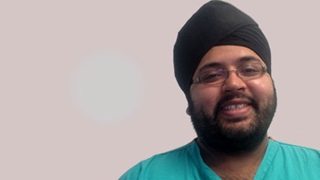 I remember completing my UCAS form and placing Leicester as my top choice for medical school.
I remember completing my UCAS form and placing Leicester as my top choice for medical school.
The reasons for choosing Leicester as my top choice was due to several factors:
- Course format for phase 1 and 2 appealed with direct clinical contact
- When I visited the open day I found everyone was friendly, helpful and enthusiastic. All the current medical students I met at that time were very positive about the curriculum.
- The location of the Student Halls in Oadby, which is a lovely area of Leicester. I found this was exceedingly different from most Universities with halls often in a neglected part of the city, where as Oadby is a lovely suburb.
- It is only 2 hours drive from my parents home, so this made it easy to visit them in term time on a weekend when I had time and it did not feel like a huge effort.
During the 5 year course I felt nurtured, encouraged and valued. The University staff were accommodating generally and the Assistant registrar for the medical degree was amazing along the 5 years. The clinical rotations were primarily at the three hospitals in the City, which are all easy to get to. The outblock rotations are all about 1 hours drive away from the city meaning that you aren’t trekking sheer miles away when you go to one of these locations. Clinicians who work at the three hospitals are enthusiastic to teach, friendly and awe inspiring. For example I was on a stroke block being taught clinical skills by two consultants; the hands on teaching that I had on examining the nervous system made the entire process logical, organised and systematic. Even now 16 years later I use the way I was taught when I examine the nervous system. I enjoyed the teaching so much and was inspired by the consultants that I came back to work for them as a Foundation Doctor after I qualified.
Since qualifying I have gone down the route of surgery, specialising in head & neck surgery. I completed my training in the East Midlands, having spent two years in Sydney Australia carrying out research for a Doctorate in Medicine degree that I also received from Leicester. Currently I am working in Newcastle Upon Tyne in a Royal College of Surgeons Head and Neck cancer fellowship. Once I complete this then I am going on an international fellowship to Adelaide Australia to gain specialist expertise in robotic Head and Neck surgery. As part of my career pathway medicine has allowed me on two occasions to work abroad in Australia, this is a great privilege that being doctor allows. Allowing the world to be your oyster.
If I could go back in time now to my UCAS selection form I would whole-heartedly put Leicester again at the top of the form. To quote a Nike™ advert: “just do it!”.